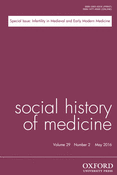-
Views
-
Cite
Cite
Theresa L. Tyers, ‘In the Merry Month of May’: Instructions for Ensuring Fertility in MS British Library, Lansdowne 380, Social History of Medicine, Volume 29, Issue 2, May 2016, Pages 267–289, https://doi.org/10.1093/shm/hkv029
Close - Share Icon Share
Abstract
This paper explores the advice for fertility and health care contained in a late fifteenth-century manuscript: London, British Library MS Lansdowne 380. This study has chosen to engage with the larger theme of whether women had access to medical writings in the vernaculars of later-medieval England and whether this enabled them to control their own fertility. The paper shows that many women did have direct access to written knowledge, and that this knowledge combined theoretical and practical understanding for use in a domestic setting. Rather than being disenfranchised from responsibility for their own fertility, women collaborated with their husbands to ensure offspring and the future of their families. By refining the understanding of the use of manuscripts, the source of the knowledge they contained, and the question of ownership, the paper adds to our awareness of the scope and practice of fertility medicine in the later Middle Ages.




